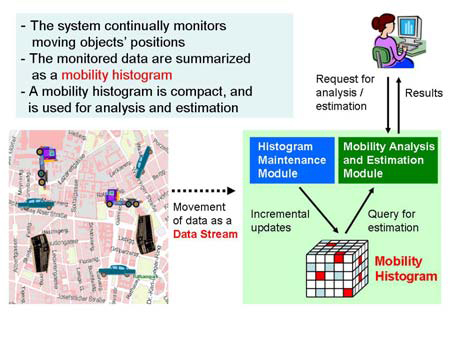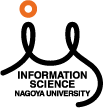Comprehensive List of Researchers "Information Knowledge"
Department of Systems and Social Informatics
- Name
- ISHIKAWA, Yoshiharu
- Group
- Knowledge Society and Information Systems Group
- Title
- Professor
- Degree
- Dr. of Engineering
- Research Field
- Databases / Data engineering / Web information systems

Current Research
Data Engineering for Taming Large Dynamic Databases
OUTLINE
We are pursuing various projects in the field of database research. The world today faces great challenges in managing and using enormous amounts of data. Furthermore, the data exchanged is becoming highly dynamic. Our focus is on developing new technologies for such evolving databases.TOPICS
(1) Spatio-Temporal Databases
A spatio-temporal database is a type of database that has a facility to represent and manage objects with spatial features as well as temporal ones. An example is a moving object database that aims to manage moving objects such as vehicles on a road network. Since the data contained in a moving object database is highly dynamic, new methodologies for monitoring and tracking its continual changes are needed. Our research includes the following topics: data modeling for spatio-temporal databases, location-based information services, summarization and mining of trajectory data for large moving object databases, etc.
(2) Web Databases and XML Databases
It is often said that the Web has changed everything since its emergence in the mid-1990s. The Web continues to evolve and its connection to our daily life is ever strengthening. We have been investigating data engineering technologies related to the Web, such as trying to find valuable Web pages for a specific geographical area combining contents analysis and link analysis techniques with the help of database technology. In addition, we are developing an information extraction method that includes a data cleaning facility to cope with heterogeneous and noisy data on the Web. Another related topic is research on document databases. Electronic documents, especially XML documents, play important roles in data representation and exchange on networks. We are developing technologies suited for such document-intensive databases.
(3) Information Retrieval and Text Mining
In traditional information retrieval settings, the target documents are stored persistently in a storage space and a user issues a query in an ad-hoc manner. In contrast, in today's networked world, a large number of documents such as news articles are delivered continually through the network, thus the importance of efficient and effective document filtering and summarization is increasing. One of our research topics in this direction is the novelty-based incremental document clustering method. Its primary feature is that it places high importance on recent documents and forgets old, obsolete ones. This method is highly useful for presenting “hot topics” to users.
(4) Data Mining for New Application Domains
The aim of data mining is to extract useful knowledge from a large database. Its main target has been relational databases managed by a relational data management system (RDBMS). However, the targets of data mining are now becoming broader. New types of data such as XML, Web, spatio-temporal data, and stream data have different formats and semantics. In addition, different data types have different requirements for data mining. We are developing data mining methods suited for such new application domains.
FUTURE WORKWe are currently conducting new research towards two major areas through enhancing our current developments. The first one is P2P (peer-to-peer) databases. Databases in a P2P network environment are loosely connected and exchange information using P2P networks. Stable data integration without losing flexibility and scalability is quite an interesting research theme. The second one is sensor databases to support monitoring and querying of streamed data in a sensor network. We are planning to extend our research on spatio-temporal databases to this research area.

Figure : Continual monitoring of moving objects
Career
- Dr. Eng degree in 1995.
- Research Associate at NAIST (1994-1999)
- Visiting Researcher, Maryland University, USA (1997-1998)
- Assistant Professor at University of Tsukuba (1999-2003)
- Associate Professor at University of Tsukuba (2003-2006)
- Professor at Information Technology Center, Nagoya University (2006-2013)
- Professor at Graduate School of Information Science (2013.3-)
Academic Societies
- IPSJ
- IEICE
- JSAI
- DBSJ
- ACM
- IEEE
Publications
- Processing Methods for Nearest Neighbor Queries Based on Imprecise Location Information, IEICE Transactions on Information and Systems (Japanese Edition), J93-D(6), 781-794 (2010).
- Query Processing in a Traceable P2P Record Exchange Framework, IEICE Transactions on Information and Systems, E93-D(6), 1433-1446 (2010).
- A Novelty-based Clustering Method for On-line Documents, World Wide Web Journal, 11(1), 1-37, Springer (2008).
- Record Extraction from Large-scale Text Resources Considering Topics, IPSJ Transactions on Databases, 48(SIG 14)(TOD 35), 107-123 (2007).
- A Dynamic Mobility Histogram Construction method Based on Markov Chains, IEICE Transactions on Information and Systems (Japanese Edition), J90-D(2), 311-324 (2007).








